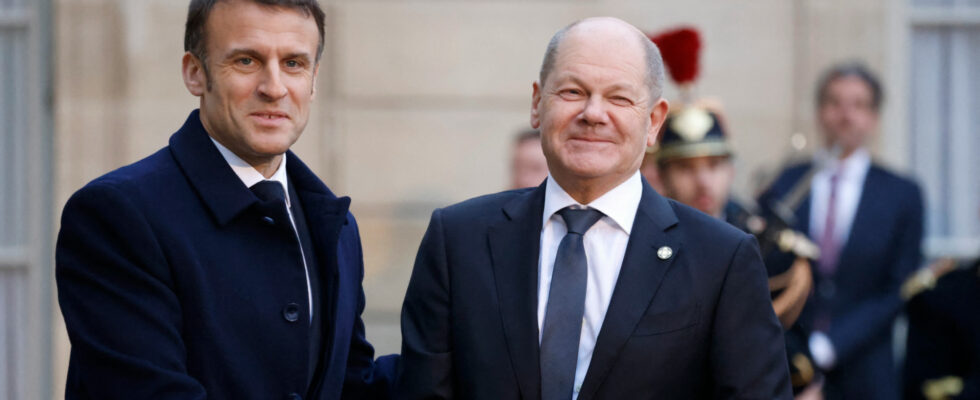Arthur Delaborde, with AFP / Photo credit: Ludovic MARIN / AFP
The last meeting of Olaf Scholz and Emmanuel Macron ended in a clash. The two leaders meet Friday in Berlin, with the Pole Donald Tusk, for a meeting on aid to Ukraine placed under the sign of appeasement. The French president and the German chancellor will not have much of the tête-à-tête planned at midday to remove misunderstandings after their acerbic exchanges which followed the conference in support of Ukraine organized at the Élysée on the 26 FEBRUARY.
Their meeting at the chancellery on Friday will be followed by a meeting with Polish Prime Minister Donald Tusk. Warsaw’s intervention is welcome, underlines expert Nico Lange, associate researcher at the Munich Security Conference. Former President of the European Council, he is “used to combining contradictory interests. He is capable of calming down differences,” believes Nico Lange.
Sending ground troops, long-range missiles, mounting aid to kyiv… differences have multiplied between France and Germany, weakening the allies’ message of unity. The quarrel comes at a bad time when Russian forces are advancing in eastern Ukraine, particularly due to the running out of Western aid.
Russian President Vladimir Putin is heading towards a new coronation, assured of winning an additional six-year mandate in the unopposed presidential election which runs until March 17.
German soldiers
Friday’s summit is “a good sign which shows that things are falling into place and that mistakes are perhaps being corrected”, says Nico Lang. Polish Foreign Minister Radoslaw Sikorski says he is “confident about what this three-way summit can represent”. “Internal pressures within the coalition (German, editor’s note) and international pressures on Chancellor Scholz encourage more action,” he said in an interview published Thursday by the daily West France.
The three leaders must also smooth things over before an important European summit in Brussels on March 21 and 22. At the end of February, the French head of state’s statements regarding the possible sending of troops to Ukraine caused confusion. Such a possibility was categorically rejected by Olaf Scholz. “Discussions had taken place (…), but the chancellor had insisted that they should not be made public,” says Jacob Ross, of the German think tank DGAP.
The dissonances rose a notch the following week when Emmanuel Macron estimated in Prague that Europe was entering a moment “where it would be appropriate not to be cowardly”. And the French president insisted Thursday evening by affirming that those who place “limits” on the commitment to support Ukraine “are not choosing peace but choosing defeat”. “If Russia were to win (…) we will no longer have security” and the “credibility of Europe will be reduced to zero,” Emmanuel Macron further warned.
The German leader, who fears the escalation of the conflict, is criticized by several of his allies and even within his majority for his refusal to deliver long-range Taurus missiles, because their adjustment would, according to him, require military intervention. Germans.
In campaign
“This must not happen with German soldiers – as chancellor I have the responsibility to prevent Germany from participating in this war,” he reaffirmed in the Bundestag on Wednesday. “Caution should not be called weakness, as some do,” added the Chancellor. Olaf Scholz constantly repeats that Germany is the largest European contributor in absolute value of financial and military aid to kyiv, far ahead of France.
As the meeting approaches, it is already time for diplomatic remarks: Olaf Scholz assured Wednesday that he has “a very good personal relationship” with Emmanuel Macron, while experts regularly highlight the differences in character and political styles between the The German with a cautious nature and his French counterpart fond of flashes.
The approach of the European elections interferes in the strategy of the two leaders, attentive to their public opinions. Olaf Scholz, in free fall in the polls, is “under pressure” from his social democratic party, believes Nico Lange. A majority of Germans, according to a recent poll, are opposed to the delivery of Taurus missiles. Emmanuel Macron’s camp is focusing its campaign for the European elections on support for Ukraine, accusing the far right, favorite of the election, of pro-Kremlin positions.
